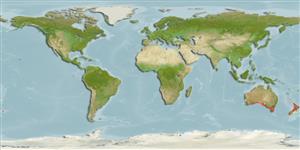Common names from other countries
分類 / Names
共通名の | 類義語 | Catalog of Fishes(部類, 種) | ITIS | CoL | WoRMS | Cloffa
Environment: milieu / climate zone / depth range / distribution range
生態学
海 底生の; 深さの範囲 20 - 200 m (Ref. 9563). Temperate; 29°S - 47°S, 113°E - 176°W
Indo-West Pacific: New Zealand and Australia (southern Western Australia to New South Wales and Tasmania).
サイズ / 重さ / 年齢
Maturity: Lm ? range ? - ? cm
Max length : 31.0 cm TL オス/雌雄の選別がない; (Ref. 9563); common length : 25.0 cm TL オス/雌雄の選別がない; (Ref. 9258)
背面の脊椎 (合計) : 2; 背鰭 (合計) : 32 - 38; 臀鰭: 31 - 36. Scales small with numerous tiny spinules, prominent first dorsal spine above eyes (Ref. 9002).
Inhabits rocky weedy areas from the shore to at least 60 m. Generally solitary but may aggregate in groups of 10-15 individuals in midwater. Feeds mainly on sessile and encrusting organisms, with sponges and ascidians predominating (Ref. 26966); also seen feeding mid-water on zooplankton and likes to bite diver's fingers (Ref. 9002).
Life cycle and mating behavior
Maturities | 繁殖 | Spawnings | Egg(s) | Fecundities | 幼生
Armitage, R.O., D.A. Payne, G.J. Lockley, H.M. Currie, R.L. Colban, B.G. Lamb and L.J. Paul (eds.), 1994. Guide book to New Zealand commercial fish species. Revised edition. New Zealand Fishing Industry Board, Wellington, New Zealand, 216 p. (Ref. 9258)
CITES (Ref. 128078)
Not Evaluated
Human uses
水産業: 商業
用具
特記事項
XMLをダウンロードして下さい
インターネットの情報源
Estimates based on models
Preferred temperature (Ref.
115969): 13.4 - 17.7, mean 15.1 (based on 141 cells).
Phylogenetic diversity index (Ref.
82804): PD
50 = 0.5039 [Uniqueness, from 0.5 = low to 2.0 = high].
Bayesian length-weight: a=0.02754 (0.01477 - 0.05134), b=2.97 (2.81 - 3.13), in cm Total Length, based on LWR estimates for this species & (Sub)family-body (Ref.
93245).
栄養段階 (Ref.
69278): 3.1 ±0.0 se; based on diet studies.
回復力 (Ref.
120179): 手段, 1.4年~4.4年の倍増期間の最小個体群 (Assuming tm=2).
Fishing Vulnerability (Ref.
59153): Low to moderate vulnerability (27 of 100).
Climate Vulnerability (Ref.
125649): Moderate to high vulnerability (49 of 100).
